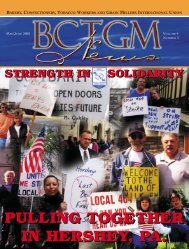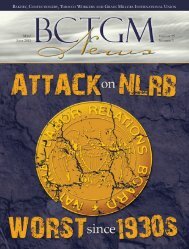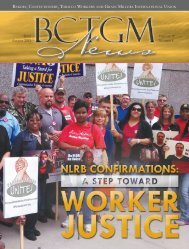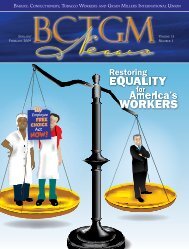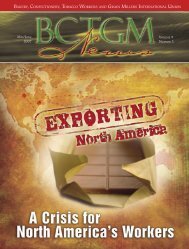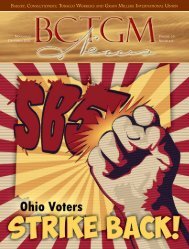to download a printable PDF - Bakery, Confectionery, Tobacco ...
to download a printable PDF - Bakery, Confectionery, Tobacco ...
to download a printable PDF - Bakery, Confectionery, Tobacco ...
Create successful ePaper yourself
Turn your PDF publications into a flip-book with our unique Google optimized e-Paper software.
OSHA Scrutinizes<br />
Employer Safety Programs that<br />
Discourage Reporting of Injuries<br />
In mid-March the Occupational Safety and<br />
Health Administration (OSHA), announced<br />
a new policy memorandum, which was<br />
sent <strong>to</strong> all Regional Administra<strong>to</strong>rs<br />
and Whistleblower Program<br />
Managers, outlining the Agency’s<br />
policy concerning Employer Safety<br />
Incentive and/or Disincentive<br />
Policies and Practices.<br />
While the memorandum does<br />
not create any new protections for<br />
workers, it clearly articulates what<br />
types of safety programs violate the<br />
spirit of the Act.<br />
For years, labor unions and<br />
occupational safety advocates have been<br />
urging OSHA <strong>to</strong> look more closely at Employer safety<br />
incentive programs that either punish a worker for<br />
reporting an injury, or offers workers incentives <strong>to</strong> keep<br />
their injuries quiet.<br />
The memorandum makes several things very clear:<br />
• Section 11 (c) of the OSH Act prohibits<br />
an employer from discriminating against an<br />
employee because the employee reports an<br />
injury or illness.<br />
• Reporting a work-related injury or illness is<br />
a core employee right, and retaliating against<br />
a worker for reporting an injury or illness is<br />
illegal discrimination under the Act.<br />
• There are several types of workplace<br />
safety policies and programs that could<br />
discourage reporting and could constitute<br />
unlawful discrimination and a violation of<br />
Section 11 (c).<br />
According <strong>to</strong> the memorandum, “if employees<br />
do not feel free <strong>to</strong> report injuries or illnesses, the<br />
employer’s entire workforce is put at risk. Employers<br />
do not learn of and correct dangerous conditions that<br />
have resulted in injuries, and injured employees may<br />
not receive the proper medical attention, or<br />
the workers’ compensation benefits <strong>to</strong><br />
which they are entitled.”<br />
In the memorandum, OSHA<br />
outlined the most common<br />
potentially discrimina<strong>to</strong>ry policies,<br />
including:<br />
• Policies that take disciplinary<br />
action against employees who are<br />
injured on the job, regardless of the<br />
circumstance surrounding the injury (i.e<br />
through no fault of their own).<br />
• Policies that punish workers for being injured<br />
on the grounds that they violated a company<br />
safety rule.<br />
• Policies that restrict the time in which an<br />
employee can report a workplace injury or<br />
illness.<br />
• Policies that intentionally or unintentionally<br />
provide an employee an incentive NOT <strong>to</strong><br />
report an injury or illness (i.e. safety incentive<br />
programs that either offer rewards <strong>to</strong><br />
employees who do not report an injury, or take<br />
away rewards from employees who do report<br />
an injury).<br />
OSHA also found that the potential for unlawful<br />
discrimination under these types of policies may<br />
increase when management or supervisors receive<br />
bonuses if injury reporting is low or non-existent.<br />
According <strong>to</strong> BCTGM International President<br />
Frank Hurt, this is a good first step in addressing the<br />
problem of employer safety programs that punish<br />
workers for being injured on the job. “Perhaps further<br />
enforcement in this area will force employers <strong>to</strong> focus<br />
on eliminating hazards, instead of punishing our<br />
members for suffering an injury on the job,” said Hurt.<br />
10 BCTGM News





